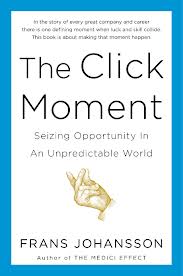OLD POST ALERT! This is an older post and although you might find some useful tips, any technical or publishing information is likely to be out of date. Please click on Start Here on the menu bar above to find links to my most useful articles, videos and podcast. Thanks and happy writing! – Joanna Penn
As an entrepreneur, I love to read business books and sometimes, one comes along that just makes me go crazy with enthusiasm!

In the short video below, I explain some of the key things I learned, and there are also some brief notes below the video.
Embrace the random
- The ‘10,000 hour' rule – where practice and mastery will deliver success eventually – is only applicable in industries that have rules e.g. tennis, chess, violin. Where there are no rules, like fiction writing, or business start-ups, practice and mastery doesn't make a difference to the breakout success story. Examples of breakout success without 10,000 hours: Virgin's Richard Branson starting an airline with no experience, Stephanie Meyer's Twilight, EL James 50 Shades.
- If we pursue an approach that we know has worked in the past, we can be certain that competition will be fierce – others will pursue it as well. Whatever advantage we created is eliminated and success is as elusive as ever. Efficient market theory.
- Your chances of success drop when you analyze the market and try to predict what you need to do to succeed.
- Our brains are designed to perceive order instead of randomness. We find patterns where there are none. It's easy to mistake randomness for skill. When something happens, we tend to believe there's a larger plan in place
Make more bets and minimize the size of them
- Make bets, using randomness to your statistical advantage. This opens you up to unexpected interactions and effects. You have a simpler time making a successful bet if you try a lot of them.
- In academia, the chances of writing a ground-breaking paper are directly correlated to the number of papers written. You get more chances with more rolls of the dice.
- Picasso created more than 50,000 works of art in his time – other estimates have it at over 100,000. He created a lot of crap as well as the masterpieces, but he couldn't predict with certainty what would get picked. His output gave him the edge to be successful.
Create more click moments
- Planned situations with expected outcomes don't generate the chaos and randomness necessary to discover unique ideas.
- “We have a strategic plan. It's called doing things.” Herb Kelleher, South West Airlines. Act, but intentionally inject randomness into your actions
- Take your eye off the ball. Explore things not directly related to your goal and don't be focused all the time, or you will miss the unexpected things that might happen along the way. Allow time to go off schedule. Search for inspiration in fields, industries and cultures different from our own. Diversity unleashes surprises.
Putting this into practice as an author
(1) There are no rules in fiction. I will continue to share my journey here, and avidly follow what others are doing. I can't help myself, and I hope you will also stick around to join in with your comments BUT/ in my own fiction I will experiment more, and you should too. Just because some genre trope or some marketing thing worked for one author doesn't mean it will work for you or me, so let's stop trying to find rules in the chaos and embrace the random.
(2) The novella business model = spreading the bets. I am increasingly drawn to this because
a) length is no issue with an ebook
2) it means more output in a shorter time and more product on Amazon means more chances to catch people's attention
3) the story arc of a novella is shorter and since I am someone who puts in serious amounts of research I will be able to write faster
4) blending novellas in between full-length novels means my readers are happier, and perhaps I can grow a fan-base more quickly
The inspiration for this has been building for a while and the ‘click moment' has just completed the circle really. Check out the Self-Publishing Podcast for how David Wright & Sean Platt use this model and they also discuss it with Hugh Howey, author of Wool here (self-published novella that went stratospheric and got optioned for movie rights by Ridley Scott)
3) Create more click moments for idea generation. Invite randomness in. I am definitely guilty of narrowing what I consume based on the time pressures we are all under, but I am determined to expand my possibilities by expanding my comfort zone into things that are a little different. I am going to allow time to go off schedule.
I'm currently looking at my plans for 2013 and how I will change the way I work now I am ‘growing into' being an author. These aspects will be part of it and I'm excited about the next steps. I'll be sure to share the journey here!
What do you think about these Click moments? Please do leave a comment below, and go buy the book!


Many good ideas here about the value of random input to creativity. Have to say I still believe in the 10,000 hour (or million word) rule when it comes to writing. No matter how receptive you are to random stuff you still need technique to synthesize it into readable prose. A LOT of technique. Don’t know that there are any Mozarts in writing.